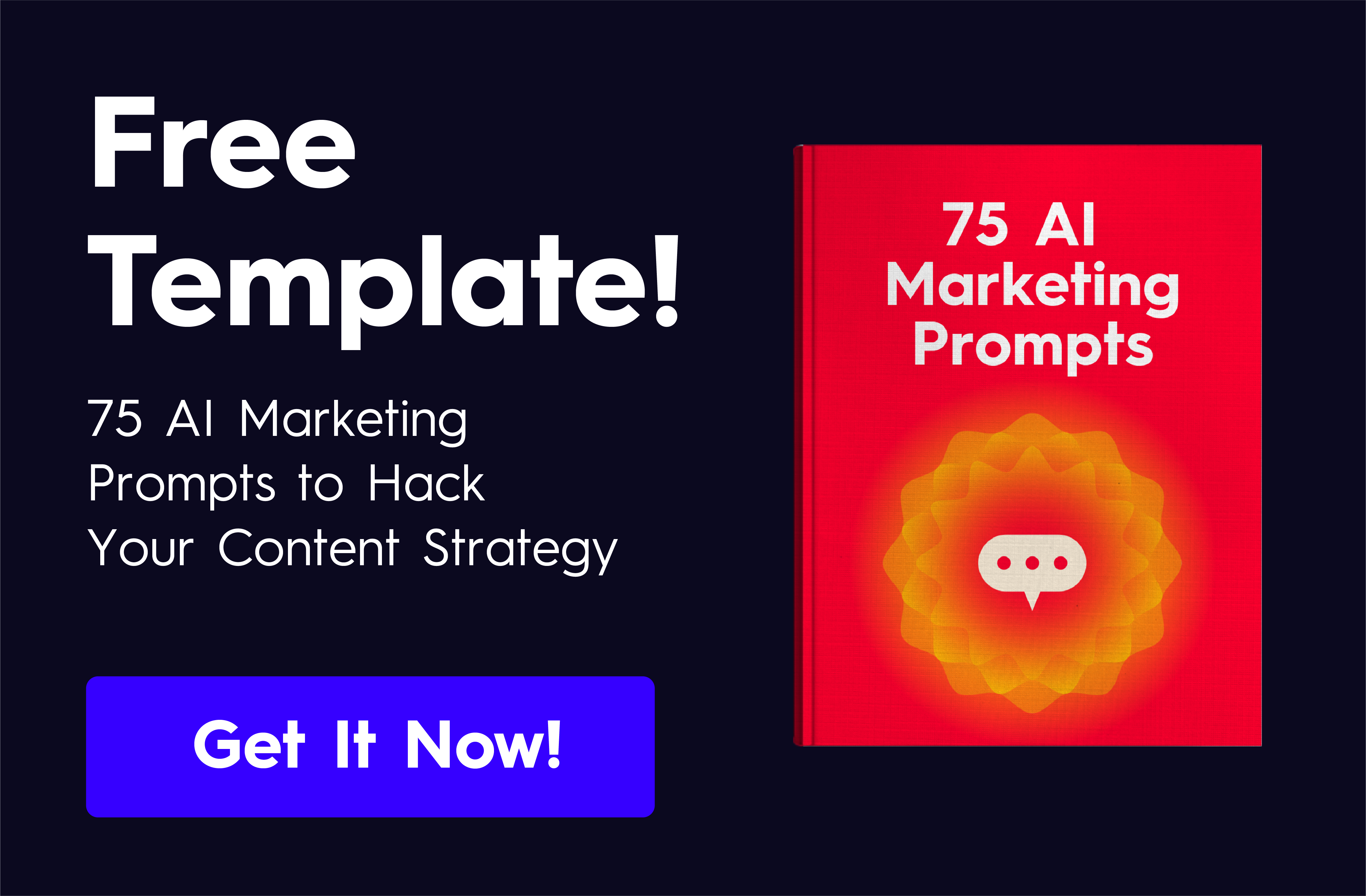There’s one thing we know for sure: AI is here, and it’s here to stay. But what will AI mean for marketers in a year, five years, ten years? What do you need to do now to prepare for the inevitable future? What areas should you focus on, and what do you need to think about down the line?
Lately, we’ve been deep in the AI trenches, digging into the latest research, experimenting with our own marketing, and gaining deeper insight into the entire AI landscape. So today, we thought we’d talk about some of the biggest AI marketing trends and predictions we can make, based on the latest research.

10 Expert AI Marketing Trends and Predictions
From chatbot implementation to job elimination, here are some of the most significant changes, insights, and issues to think about as you approach the next few years of marketing.
Prediction 1: AI will be implemented across all industries—whether you like it or not.
AI is not a choice—it is an inevitability. Nearly every business sector has or will adopt AI in some form. And there is no question that marketers will be at the forefront, as AI helps complete a truly mindboggling array of tasks.
67% of businesses already use AI for content marketing and SEO. (Semrush 2024)
Although there may be hesitancy and some genuine concerns, marketers who don’t embrace AI from the jump will undoubtedly be left in the dust, especially as more and more customers demand a customer experience that can be greatly enhanced by AI tools.
88% of marketers believe their organization must increase its use of automation and AI to meet customer expectations and stay competitive. (Mailchimp 2023)
In short, if you want to maintain relevancy—for your brand and your personal career—you must have a baseline understanding of the technology.
Tip: Familiarize yourself with AI’s capabilities, best practices, and tools, and begin experimenting in small ways. You can start by diving into our ultimate AI marketing guide, along with 75 free prompts to build a strong AI marketing strategy.
Prediction 2: The way you work will look very different—and require more intelligent strategies.
Because AI is so effective at tackling those mundane tasks—reporting, outlining, data analysis, etc.—a marketer’s day-to-day duties will shift drastically.
Current generative AI and other technologies have the potential to automate work activities that absorb 60-70% of employees’ time today. (McKinsey 2023)
Work will become more focused on high-level thinking, strategy, and intelligent experiments that follow through on well-thought-out hypotheses. Marketers who can connect large ideas, keep up with the zeitgeist, and bring exciting and bold ideas to the table will win over those who can simply perform grunt work.
Tip: Strategy is always the key to a successful marketing operation. You should constantly be reviewing and refining as you go. If you’re not sure where to start, try these ideas to improve your strategy.
Prediction 3: Outreach will look very different.
More and more public-facing content will be AI-generated. This is exciting in terms of efficiency, as AI will allow you to reach more targeted audiences (and reach more people within those audiences).
By 2025, 30% of outbound marketing messages from large organizations will be synthetically generated. (Gartner 2023)
However, as AI-generated outreach becomes more common, humans will become more skeptical of those messages. You will need to refine that messaging to stand out in the crowd.
Tip: If you want to reach people effectively, you need to know what drives them. See our guide to build ideal customer profiles and personas to identify these emotional drivers and better tailor your messaging to them.
Prediction 4: If you want to win, you’ll need to invest in training—yesterday.
While many marketers are intimidated by AI, the real hesitancy comes because they simply don’t understand how to use it.
According to the AI Marketing Institute, marketers cite a lack of education and training as the #1 barrier to adopting AI.
This problem is pervasive, especially as research has found that many C-suite execs are also largely uninformed about the application and implication of AI in their organizations.
As Paul Roetzer, Founder & CEO of the AI Marketing Institute, says: “Millions of jobs will be impacted as companies realize the power and potential of AI to drive productivity, efficiency, and profits. Yet, the vast majority of leaders charged with guiding their organization’s vision, strategy, and teams lack even a baseline understanding of the technology.”
78% of marketers say their employers have no internal AI-focused education or training. (AI Marketing Institute 2023)
Education is paramount—even if you don’t have a massive budget. You should research and share insights from online resources (e.g., the AI Marketing Institute), encourage specific team members to experiment with tools and report back, etc.
Tip: We like Allie Miller’s AI with Allie newsletter, which serves up snackable insights, tips, and news to keep you in the know.
Prediction 5: A lack of policy will be a huge problem.
Yes, AI is capable of incredible things. But, as it is an evolving technology, organizations have to decide how and when it is appropriate to use it.
- What are the risks of relying on AI to complete specific tasks?
- What information could and should be shared with AI?
- How transparent do you need to be about using AI in your organization or content?
Remember: Your brand reputation is your most valuable asset. You need to protect it wisely and consider any ethical or security risks that might hurt your credibility with your audience.
Only 21% of respondents whose organizations have adopted AI say they have established policies governing employees’ use of gen AI technologies in their work. (McKinsey 2023)
Tip: Start these discussions within your team. Consider the appropriate applications for AI, the potential risks, what and when you need to disclose, etc. Then craft clear guidelines for your team (and any other content creators) to adhere to.
Prediction 6: AI-generated content won’t be the silver bullet for SEO.
AI has huge implications for SEO, but it may not be as effective as we think. Why? Because if you want to win in SEO, you need to infuse your content with EEAT:
- Experience
- Expertise
- Authority
- Trust
As AI-generated content has flooded Google in the last year or so, we’ve seen more high-level AI-generated content from an “expert” perspective, but we haven’t seen as much real-life experience infused into that content. The result is a high volume of content from different sources—that generally says the same thing. Unsurprisingly, although AI can help marketers generate a higher volume, human-generated content continues to outperform AI-only content.
94.12% of the time human written content outranks AI-created content. (Neil Patel 2024)
That doesn’t mean AI can’t help SEO. The best, most effective content combines both human and AI-generated brainpower. Again, experience is the most significant way you can enhance AI-generated content. By demonstrating your experience via anecdotes, examples, case studies, data, etc., you can prove that you are a real person with real, valuable perspective. That is how you can outshine anybody relying on AI-generated content only.
Tip: Craft articles around longtail keywords that answer specific questions, then add more EEAT. See our handy guide to SEO for the latest best practices and tips to do that effectively.
Prediction 7: CMOs will have to work harder to protect their content.
Because anyone can create content anytime—and some AI tech has come under fire for plagiarism—it will be more imperative for CMOs to protect their brand integrity through different tools.
By 2026, 60% of CMOs will adopt specific technologies to protect their brands from GenAI-driven deception.
(Gartner 2024)
This may include content authenticity tech to protect against misinformation, stricter guidelines for brand-generated content, additional layers of fact-checking, etc.
Prediction 8: Chatbots will provide the immediate resolution that customers demand.
Savvy brands are already adopting chatbots and other customer service tools to enhance their customer experience, reduce resolution times, and free up resources.
About 90% of customer queries are resolved in 10 messages or fewer. (Tidio 2024)
This tech is one of the smartest ways to provide better customer service without a heavy lift. Not only will chatbots become more prevalent but consumers will soon expect them on your site.
By 2025, 80% of customer service and support organizations will apply generative AI technology to improve agent productivity and customer experience.(Gartner 2023)
Tip: Personalization is the key to conversion. Look for ways to enhance your customer experience throughout the buyer journey with these AI tools for personalization.
Prediction 9: Jobs will be eliminated—and created.
One of the biggest fears around AI is that it will replace existing jobs. While it will not replace every job, it will replace some—and shift what others look like.
Drew Kraus, a Gartner VP Analyst, says we can expect organizations to replace 20-30% of their agents with generative AI.
However, AI cannot function alone. Not only does it need a human to interface with but it also needs to be fact-checked and monitored, as we have seen more and more AI-gone-wrong stories. Thus, Kraus also predicts that while AI will eliminate jobs, it will create additional jobs. Those who can effectively harness AI will be in high demand and command a higher salary.
By 2026, 80% of senior creative roles will be tasked with harnessing GenAI, resulting in increased spending for skilled talent.
(Gartner 2024)
Tip: If you want to stay competitive, learn how to work with AI—and look for more intelligent ways to use it to improve your results. AI is a good servant, not a good master—it’s up to you to become the master.
Prediction 10: Some brands will win because they do not embrace AI.
While AI is the future for many brands, some brands will take a firm stance against it—and win. As the tech evolves, there will likely be more missteps (which will erode trust in the tech and/or brands that use it unwisely), so some brands may choose to eschew the technology entirely.
According to Gartner, by 2027 20% of brands will leverage an absence of AI in their business as a point of differentiation.
We’ve already seen this angle pop up in marketing, as more brands are promising that you’ll always talk to a real person—never AI—when you call customer service. We are likely to see more of these so-called “acoustic brands” build their cache around their anti-AI stance, emphasizing trust, transparency, and their humanity.
Remember: The Future of AI Ever-Changing
Although we can see where the future is heading, no one can predict every twist and turn along the way. But the more you educate yourself, the better you can navigate the unknown. If you want to keep up…
- Continue to experiment with AI tools to increase your knowledge.
- Have open conversations about how you’re applying these tools, the insights you’re learning, and how they’re improving your results.
- Communicate with your audience about their perspectives and preferences when it comes to AI.
- Subscribe to our Best Story Wins for the latest AI conversations from industry experts.
And if you need any support to improve your marketing strategy—whether or not it includes AI—find a partner with the experience and expertise you need. You can start your hunt with our tips to find the right agency, or find out what it’s like to work with us.



